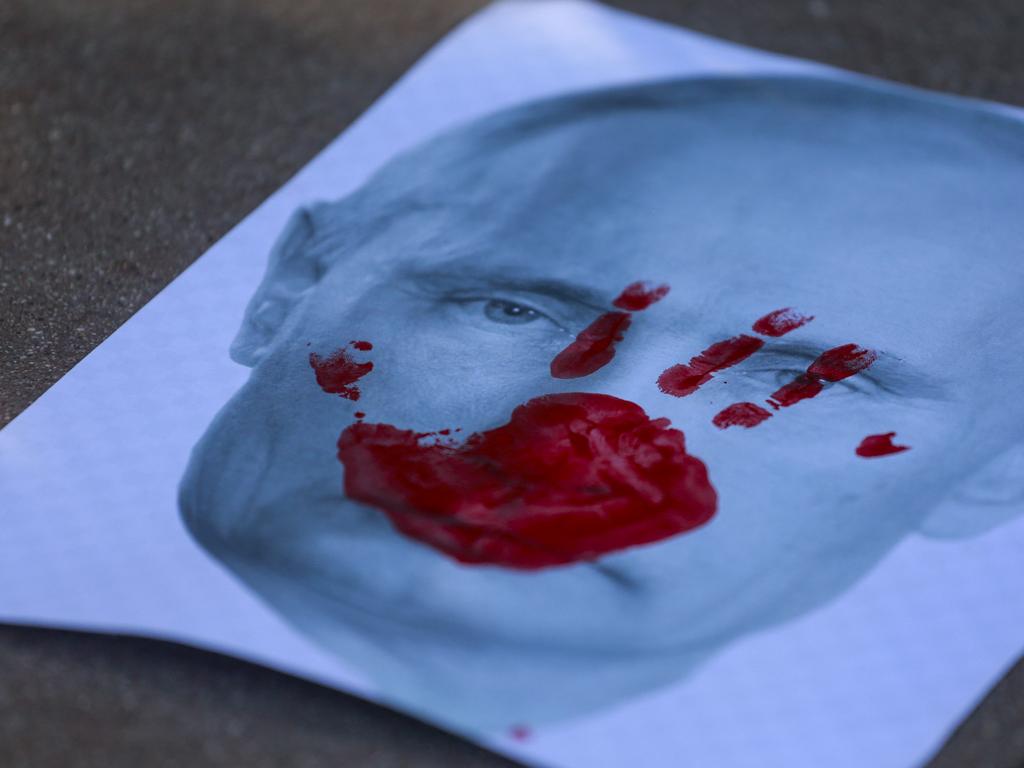Ukraine: Vladimir Putin raises the war stakes with nuclear alert
Vladimir Putin put his nuclear forces on high alert as Ukrainian officials vowed they would not give up ‘one inch of our territory’ ahead of the first diplomatic talks.

Vladimir Putin put his nuclear forces on high alert, stoking tensions with the west, as Ukrainian officials vowed they would not give up “one inch of our territory’’ in the first diplomatic talks with Russia since Moscow launched its invasion last Thursday.
After days of fighting in which Ukrainian forces held the Russian soldiers at bay outside the capital Kyiv and pushed them back from the second largest city, Kharkiv, Ukraine’s President Volodymyr Zelensky warned his country faced a crucial 24 hours.
There were signs Russia was preparing a major offensive, with satellite images showing a 5km convoy of mechanised Russian forces, including tanks, infantry fighting vehicles, self-propelled artillery and support vehicles, about 65km from the capital.
As his invasion force’s progress slowed, the Russian President ordered his military to put the country’s nuclear-deterrence forces on high alert in response to what he said were aggressive statements by NATO countries, and the West’s hard-hitting economic sanctions.
The US denounced Mr Putin’s escalation as “completely unacceptable” while NATO’s Secretary-General Jens Stoltenberg called it “dangerous”.
Adding to the tensions, Russian ally Belarus voted to overturn its non-nuclear status, and there were reports the country was preparing to join the war on Russia’s side.
But Beijing on Monday called for de-escalation and restraint as Russia and Ukraine prepared for the diplomatic talks.

Mr Putin’s threat came after the west’s tough economic sanctions levelled against the Russian economy forced its central bank to more than double official interest rates from 9.5 per cent to 20 per cent overnight.
Residents of Kyiv and Kharkiv woke to fresh explosions on the fifth day of fighting, as the country’s army and civilian fighters maintained control of key cities.
Ukraine’s government reported civilian casualties had reached more than 352, including 14 children, since the Russian invasion began, while a reported 400,000 Ukrainians had fled to neighbouring countries in search of safety.
Ukrainian officials said Mr Putin was trying to lift tensions ahead of the planned talks, to be held on Ukraine’s border with Belarus on Monday, local time.
Foreign Minister Dmytro Kuleba was defiant, saying: “We will not capitulate, we will not give up a single inch of our territory.”
Mr Zelensky told British Prime Minister Boris Johnson by telephone that the next 24 hours were crucial for Ukraine, Downing Street said.
The Belarusian Foreign Ministry said on social media it had prepared a venue for the talks, releasing a picture of a long table with Russian and Ukrainian flags.
Preparations for the talks came as a referendum in Belarus approved a new constitution ditching the country’s non-nuclear status in a move President Alexander Lukashenko said could open the way for Russian nuclear weapons to be hosted on Belarusian soil.
Mr Lukashenko warned Western countries that pushing Mr Putin too far with extreme sanctions and no fly zones was dangerous. “Now there is a lot of talk against the banking sector, gas, oil, SWIFT,” he said. “It’s worse than war. This is pushing Russia into a Third World War.”

There were multiple reports that Belarus was poised to enter the war with Ukraine on Russia’s side. “It’s very clear Minsk is now an extension of the Kremlin,” a senior US administration official told The Washington Post.
As the fighting continued, the commander in charge of Kyiv’s defence, Oleksandr Syrskyi, said the capital was under control despite attempts by Russia to break through its defences. “We have shown we will protect our home from uninvited guests,’’ Colonel General Syrskyi said.
A regional official, Oleg Sinegubov, said Kharkiv was also under Ukrainian control and the army was expelling Russian forces from the area.
A video posted online showed a column of Russian tanks and armoured vehicles destroyed at Bucha, outside Kyiv, while Ukraine’s armed forces claimed in an unverifiable report to have killed 4500 Russian troops since Thursday.
Russian forces had made more progress in the south, and were reportedly besieging the cities of Kherson and Berdyansk.
A senior US official said it appeared Russian forces were readying to besiege Ukraine’s major cities, in a strategy that could increase civilian casualties.
“It appears that they are adopting a siege mentality, which any student of military tactics and strategy will tell you … it increases the likelihood of collateral damage,” the official said.
In other developments, European Union diplomat Josep Borrell said the EU’s 27 member bloc would ramp up its support for Ukraine, supplying fighter jets to ward off the Russian advance.
The White House said it would hold a call with allies and partners to discuss “developments” in Russia’s attack on Ukraine and “co-ordinate our united response”.
The UN General Assembly was due to hold a rare emergency session to discuss the conflict, while in Russia, more than 5000 anti-war protesters have been arrested.
UK Foreign Secretary Liz Truss said she would “absolutely” back Britons who wanted to take up arms for Ukraine against Russia.
Scott Morrison warned Australians could be breaking the law if they attempted to join the fight.
“I would counsel against that,” the Prime Minister said.
Under Australia’s Foreign Fighters Act, Australians can participate in foreign wars if they join government forces, but not unofficial militias. Mr Morrison said cabinet’s national security committee would meet on Tuesday to determine the value of “lethal aid” Australia would provide to Ukraine through NATO.
Additional reporting: AFP







To join the conversation, please log in. Don't have an account? Register
Join the conversation, you are commenting as Logout